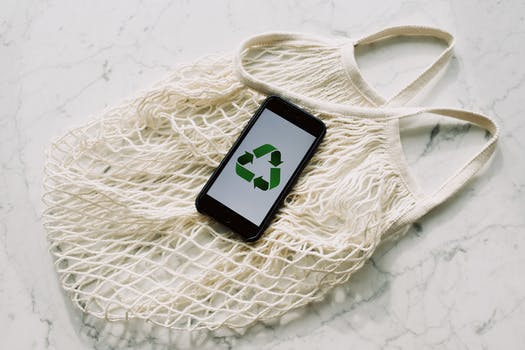Reusable bags and recycling are just two of the many ways you can reduce your waste production. The first step to lowering your waste production is being aware of what is right and wrong. (Photo courtesy of Public Domain)
According to National Geographic, the world produces about 3.5 million tons of plastic and solid waste every day (2018). The United States produces 250 million tons of trash every year. A majority of this waste ends up in landfills and dumps as well as polluting the oceans and other natural habitats.
Different types of waste can take several hundred years to decompose, leaving a surplus of products to potentially harm its surrounding environment. If people around the world become aware and cautious of the waste they produce, the total number of waste would go down drastically. This would lead to an overall environmental improvement–keeping the streets clean, habitats clean, and reducing the amount of space taken up by trash on the planet.
It can be hard to lessen the waste you produce, living in a world dominated by plastic packaging and solid waste products. Approximately 85% of Leesville Road High School students use solid waste products, like cotton, multiple times a day. Here are some simple and affordable ways to reduce the amount of waste you produce:
1. Reusable cotton products
Many people incorporate cotton products into their skincare routine. For example, using a cotton ball to apply toner, a cotton pad to remove makeup, or a cotton swab to clean ears. Feminine products used during menstrual cycles are also made out of cotton. As stated in an ELLE article, “regular cotton pads don’t biodegrade due to the bleaching and mixing process used to create them.” Users usually throw away all of these products after their use, leaving them to live in landfills for years to come.
A great alternative to cotton pads and cotton balls is a reusable cotton round. People wash the rounds after their use so they can continue to use them again and again. LastSwab, the world’s first reusable cotton swab, replaces 1000 disposable cotton swabs.
2. Reusable plastics
Replacing plastic straws and cups with reusable ones when you shop and pick up food not only reduces plastic waste but also reduces the amount of disposable plastic produced. If there is a lower demand for disposable plastic, companies will not create as much. Instead of getting a plastic straw in the drive-thru, bring a washable metal or rubber straw. When getting coffee, provide baristas with a reusable cup so their plastic ones don’t get wasted. Instead of purchasing packs of plastic water bottles every week, use reusable water bottles for your on the go drinks. Lastly, reusable containers are great for storing food instead of the take-away box styrofoam and cardboard. This small switch heavily minimizes the waste you produce every year and saves you money in the process.
3. Cleaning products
Multiple times a year, people purchase shampoo, conditioner, and body wash in plastic bottles. Getting plastic-free versions of these products allows you to do your part in helping the environment while still being clean. Another way you can do this is by swapping your plastic toothbrush for a bamboo one. Bamboo is biodegradable, making it much more environmentally friendly for when the user must throw it away and replace it. Substituting plastic razors for a metal one with replaceable blades also reduces plastic waste–they last much longer than disposable plastic razors.
4. Minimize your belongings
Before switching to zero waste products, finishing off what you already own is important. Creating more waste in the process of reducing waste will just set you back. Going through the products you will continue to buy and determining what you can recycle ensures that you will hold yourself accountable for your waste production. You can also organize old belongings and clothing and donate them to help other people from supporting wasteful and environmentally damaging fast fashion companies.
These are just a few of the many ways you can start the journey to a zero waste lifestyle. Over time, the tiny changes you make to your lifestyle can make a huge impact on the environment. Staying consistent with working on reducing your waste production guarantees progress for the whole world. For more tips on getting started, where to purchase items, and why your waste production is important, click here. For daily updates and tips on sustainability and waste reduction, follow @get.waste.ed on Instagram.

Hi! My name is Lyric and I am a senior editor and the website editor for The Mycenaean. I am also Vice President of Quill and Scroll Society, Makeup Crew Head, and a member of National English Honor Society.

Leave a Reply